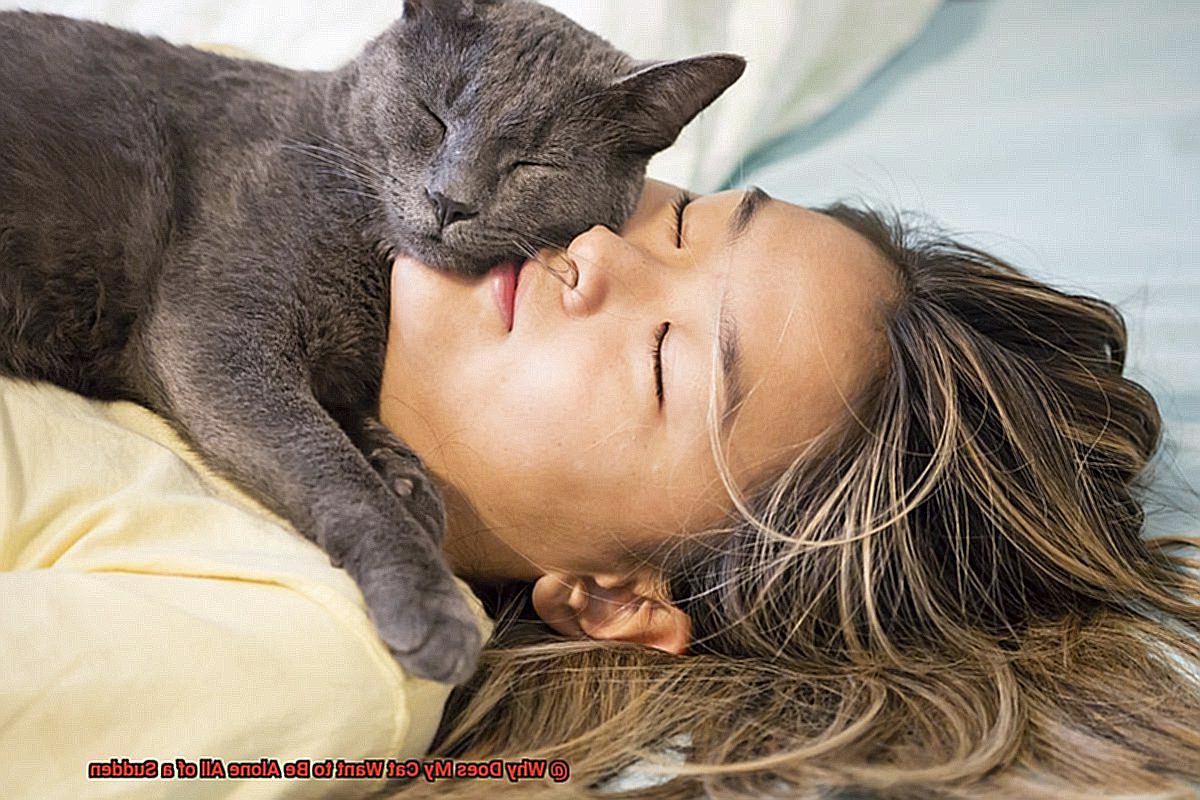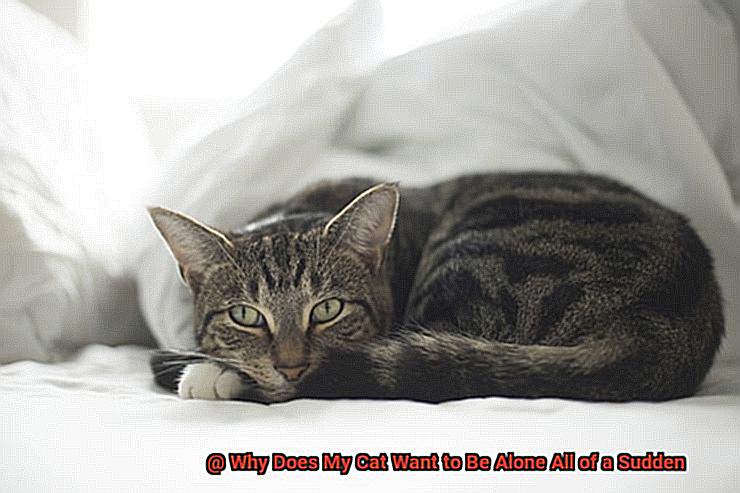Do you ever wonder why your cat suddenly wants to be alone? It’s a worry we all can relate to – cats are usually social and affectionate, so it can be disconcerting if they seek solitude.
But why does it happen? The answer is complex.
This blog post will explore the common reasons behind cats wanting to be alone, from physical health issues to environmental changes.
We’ll also look at how you can tell if your cat is sick or ill, as well as what steps you can take to make them more comfortable in their home environment.
So, if you’re concerned about why your cat wants to be alone all of a sudden, read on. This article will discuss why cats may act differently when they are hungry or sick, as well as signs that they may need medical attention.
Reasons Why Cats May Want to be Alone All of a Sudden
Cats are independent animals who need their own space and time away from others, so it’s not unusual for them to want some alone time every now and then.
However, if your cat is suddenly seeking solitude more often than usual, there may be other explanations.
Changes in the environment can cause cats to become anxious or stressed.
This could include a new pet, a move to a different home, or even an unfamiliar person in the house.

In these situations, cats may isolate themselves as a form of self-protection.
It’s also possible that your cat is feeling unwell and wants some peace and quiet to rest and recuperate without being disturbed by people or other animals.
Older cats may also just be looking for some much-needed rest and relaxation in a solitary place as they age.
Think of it like this: When we humans get sick or ill, we take a break from our daily routines in order to recharge our batteries.
Signs That Your Cat Wants to Be Alone
Cats are mysterious creatures and can be hard to read, but there are several telltale signs that your feline friend needs a break from the hustle and bustle of life.
If your cat starts hiding in dark corners or avoiding interaction with you and the family, it could be a sign that they need some solitude.
Additionally, if your cat stops responding to calls or petting, it could mean that they are feeling overwhelmed and need some space.
Changes in sleeping habits can also be an indication that something is wrong.
If your cat is sleeping more during the day or staying awake for long periods at night, this could mean that they want to be alone.
Similarly, if your cat stops eating or drinking, it may be a sign that they are feeling stressed and need some time to themselves.
Finally, if your cat hisses or growls when you approach them, this is a clear sign that they don’t want to be disturbed and require some time alone.
What You Can Do To Help Your Cat Feel More Comfortable
Creating a comfortable and secure home for your cat is the first step in helping them feel at ease.
Provide plenty of toys, activities and places to explore to keep them engaged and entertained.
Show them lots of love, but don’t force it on them if they are not in the mood.
When they do come out of their shell, let them take the lead in social interactions and give them positive reinforcement.
Establishing a routine for your cat can be beneficial in providing structure and stability to their lives.
Feeding or playing with them for a few minutes each day will help your cat know what to expect, making them feel more secure.
Playing together also helps build trust between you two people and increases the bond you share.
Finally, allow your cat to explore their environment at their own pace without pushing them into uncomfortable situations.
Letting your cat have fun in their own time will help build confidence and create a sense of safety that will make them feel more content.
How to Tell if Your Cat is Isolating Itself Due to Illness or Injury
Recognizing the Signs of Illness or Injury in Cats
When cats become ill or injured, they can often become more reclusive and withdrawn.
As a pet owner, it is important to be able to recognize the signs of illness or injury in your cat.
Common signs include decreased energy levels, changes in behavior such as hiding away from family members, reduced appetite, and changes in sleeping habits.
If you notice any of these signs in your cat, it is important to take them to the veterinarian for a checkup.
Common Causes of Illness and Injury in Cats
Illness and injury can be caused by a variety of illnesses in cats.
Urinary tract infections, kidney disease, arthritis, and broken bones are all common illnesses and injuries that may cause cats to isolate themselves.
It is important to take your cat to the vet if you suspect it is ill or injured so that it can receive proper medical care.
Paying Attention to Environmental Factors
It is also important to pay attention to any changes in your cat’s environment that could be causing them stress.
This could include loud noises, new people or animals in the house, or changes in routine.
If you think that environmental factors are causing your cat to isolate itself, it may help to make some adjustments such as providing more hiding places for them or creating a quiet area for them away from noise and activity.
Knowing When To Seek Veterinary Care
If your cat is isolating itself due to illness or injury, it may be lethargic, have difficulty breathing or walking, and be in pain.
These warnings should not be ignored as they may point to something serious going on with your pet’s wellbeing.

If you have any of these signs, it is essential to seek veterinary care right away so your cat can get the necessary treatment as soon as possible.
Developing a Close Bond With Your Cat
Developing a close bond with your cat will help you determine when something isn’t quite right with their health sooner rather than later.
Making time each day for cuddles and playtime will help create an even closer bond between you two people which will make it much simpler for both of you if they should become sick or injured at some point down the road.
It’s like having an extra pair of eyes—you’ll know if something isn’t quite right with them before anyone else does.
What To Do If You Suspect Your Cat is Ill or Injured
Cats are beloved companions, and it can be heartbreaking to see them ill or injured.
If you suspect your furry friend is not feeling well, it’s important to seek medical attention immediately.
Here are five steps to take if you suspect your cat is ill or injured.
Signs of Illness/Injury in Cats
Common signs of illness or injury in cats include reduced appetite, lethargy, hiding, and changes in behavior.
If your cat isn’t eating or drinking and appears weak or lethargic, seek medical attention right away.
Urgent Medical Attention
Your veterinarian will be able to diagnose the cause of your cat’s sudden change in behavior and suggest appropriate treatment options.
Timely intervention can make all the difference when it comes to your cat’s health and recovery.
Resting in a Safe Zone
If your cat is stressed or anxious due to their illness or injury, it’s important to provide them with a safe and quiet place to rest.
Make sure their bed is comfortable and provide them with plenty of food and water so they can recover as quickly as possible.
Veterinarian Treatment Options

Talk to your vet about any medications that may be necessary for your cat’s condition if it turns out they are ill or injured.
They may also suggest dietary changes if necessary for optimal recovery.
Ensuring Your Cat Makes a Full Recovery
With the right care and love, you will be able to ensure that your furry friend makes a complete recovery soon. Monitor their progress closely over time and don’t hesitate to get more help from the vet if needed at any stage of the healing process.
How to Make Sure Your Cat Gets Enough Socialization and Attention

Cats need socialization and attention to stay healthy and happy, just like any other pet.
To make sure your cat gets the love and care they need, there are a few important steps you can take.
Provide Toys and Interactive Activities
One of the best ways to keep your cat entertained and engaged is to provide them with plenty of toys, scratching posts, and other interactive items.
This will help keep them active and give them something to do when they’re feeling bored or lonely.

Spend Quality Time with Your Cat
It’s important to spend quality time with your cat each day by playing games, grooming them, or simply talking to them.
This will not only show your cat that you care about them but it will also help strengthen the bond between you two.
Allow Your Cat to Explore Outdoors Safely
Giving your cat the freedom to explore the outdoors safely in a secure enclosure or on a leash can be a great way for them to get some fresh air while still staying safe.
Make sure that all areas are secure so that your cat doesn’t wander off too far or get into any trouble.
Visit the Vet Regularly
Taking your cat to the vet regularly for check-ups and vaccinations is essential for their health.
This will help ensure that their health is in top condition as well as catch any potential illnesses early on before they become more serious issues.
Show Your Cat Love and Affection
Finally, make sure you give your cat plenty of love and affection on a daily basis so they know they are appreciated and loved by you.
This can be something as simple as petting them or giving them treats when they behave well.
Introduce New People Gradually
When introducing new people or animals into the household, it’s best to do it gradually so that your cat doesn’t feel overwhelmed or threatened.
Allow ample time for both parties to get used to each other before expecting them to become friends right away.
Tips for Keeping an Eye on Your Cat When They are Alone
Do you ever worry about your cat when they’re alone? It’s understandable to be concerned for their safety, but there are some simple tips and tricks you can use to keep an eye on them.
Monitor their behavior.
Pay close attention to how your cat behaves when they’re alone and look out for any changes in their behavior or habits.
If something seems off, take them to the vet for a check-up.
Check in regularly.
Make sure you check in on your cat regularly while they’re alone so that you can monitor their behavior and ensure their safety.
Provide plenty of toys and activities.
Give your cat plenty of toys and activities to keep them entertained while they’re alone.
This could include interactive toys, puzzle feeders, scratching posts, and more.
Make sure there is ample food and water available.
Ensure that there is always enough food and water available for your cat while they’re alone so that they don’t become dehydrated or hungry.
Get another pet for companionship.
If you think your cat might be feeling lonely or isolated, consider getting another pet for companionship.
This could help to alleviate some of the stress or anxiety that may be causing them to want to be alone all of a sudden.
Spend quality time with your cat every day.
Make sure you spend quality time with your cat each day so that they feel loved and secure while they’re alone in the house – after all, cats need love just as much as we do.
Conclusion
Cats are incredibly intelligent creatures, and understanding why they suddenly want to be alone can be a challenge.
This article has explored the most common causes of cats’ seeking solitude, from physical health issues to environmental changes.
It’s important to recognize signs of illness or injury in cats and seek medical attention if necessary.
Additionally, providing your cat with a variety of toys, activities, and a secure home environment is key for their wellbeing.
Also, make sure you spend quality time with your cat each day so they feel loved and safe while they’re alone in the house.







